Gladiator II
 for strong bloody violence.
for strong bloody violence.
Reviewed by: Aiden Sexton
CONTRIBUTOR
| Moral Rating: | Very Offensive |
| Moviemaking Quality: |
|
| Primary Audience: | Adults Young-Adults |
| Genre: | Action Adventure Sequel |
| Length: | 2 hr. 28 min. |
| Year of Release: | 2024 |
| USA Release: |
November 22, 2024 (wide release) DVD: March 4, 2025 |
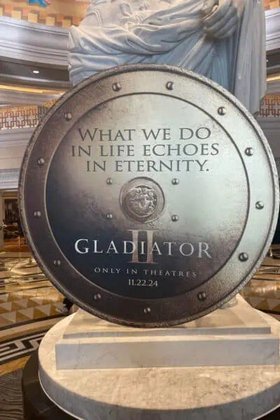

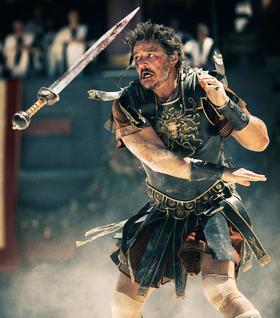

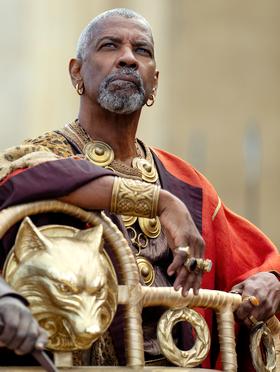
About ANCIENT ROME in the Bible
Gladiatorial combat
Seeking revenge

Tyrannical emperors of the Roman Empire
About SLAVES AND SLAVERY in the Bible
Does the Bible CONDONE SLAVERY?
FILM VIOLENCE—How does viewing violence in movies affect families?
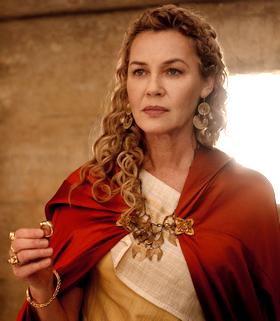
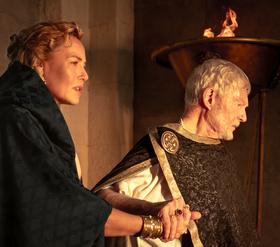
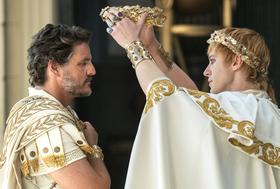
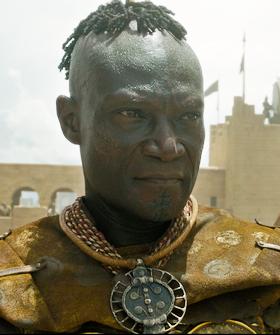
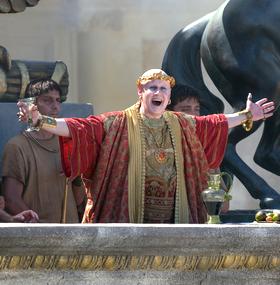
| Featuring |
|---|
|
Pedro Pascal … Marcus Acacius Paul Mescal … Lucius Versus, aka Hanno, the son of Maximus and Lucilla Connie Nielsen … Lucilla Denzel Washington … Macrinus Joseph Quinn … Emperor Geta Derek Jacobi … Senator Gracchus Fred Hechinger … Emperor Caracalla Rory McCann … Tegula Matt Lucas … Master of Ceremonies Peter Mensah … Jubartha Tim McInnerny … Senator Thraex See all » |
| Director |
|
Ridley Scott |
| Producer |
|
Scott Free Productions Paramount Pictures See all » |
| Distributor |
Prequel: “Gladiator” (2000)
For some people, this is the film we never thought we were going to get. However, in this day and age, it is becoming more and more common to release sequels to established IPs which had their genesis decades prior. While there are certainly sequels that have disappointed or even tarnished the respected name of a franchise (“Star Wars”, “Unbreakable”), every once and a while we get a sequel that supersedes and improves upon a given franchise (“Planet of the Apes”, “Top Gun”).
I came in to “Gladiator II” knowing that it was totally possible that it would tarnish the legacy of the original (one of my own personal favorite movies). And, although I highly doubted that this sequel would be able to supersede the original, I kept an open mind and knew that it was also possible that “Gladiator II” could be a worthy followup to the renowned “Gladiator.” What I’ll say is that that’s exactly the kind of mindset I would recommend for going to see this movie. Sidenote: I would also recommend not seeing any trailers, if you have somehow been spared from that, as there are some reveals in them that I was disappointed to have seen there.
I’m not going to talk about the plot in any direct or concrete way. My reasoning for this is that any part of the story I could reveal here, without giving away absolutely anything, would be too short to be worth telling. Also, there’s not a need to understand the premise for anything I’m going to say in this review. Instead, I’m going to jump straight into the positives.
The Good
As you probably guessed, the production design of this movie is absolutely breathtaking. Two scenes come to mind as especially well done, those being the beginning battle/invasion scene and a Colosseum event filled with water, boats, and live sharks (although apparently the sharks are not historically accurate). All the fighting and battle choreography is helmed very well, all of them feeling tense and raw. Ridley Scott directed this movie at 86 years old, and he shows that he still has serious skills despite his age.
The best word I can use to describe this movie from a visual standpoint is immersive. From scene one I was brought into this world that actually existed hundreds of years ago, and it seemed believable. Sure, the boats and sharks are obviously CGI, but these and other things are not at all a distraction. The sound design thunders gloriously. Hans Zimmer’s soundtrack for the original movie is one of the best there is, and Harry-Gregson Williams similarly does an excellent job with the score here.
Let’s talk about the acting. Everyone does an incredible job in my book. There came a point early on where I completely forgot I was watching actors on a set. Paul Mescal, though maybe not quite on par with the gravitas-wielding Russell Crowe the first movie graced us with, is marvelous in the lead role. I need not say that Denzel Washington gives an incredible supporting performance, as he seems incapable of doing anything less. He is indeed a marvel to watch for the (thankfully) large portion of screen time he has. Another standout is Pedro Pascal, giving a very nuanced and relatable performance throughou. Joseph Quinn plays the co-emperor of Rome, but I honestly did not notice it was him until I looked it up. This is due mainly to large amounts of makeup fitting for the time and a dynamic, insane performance.
”Gladiator II” is well paced. I cannot think of a single dull moment or scene. I also find it difficult to think of scenes here that are throwaway or filler. The 2½ hour runtime flew by so fast that at one point I was worried if it would end sooner than I hoped it would. I’ll talk about the script more later in the “bad” category, but I think there’s a lot to love about it. The story makes sense for the most part, and I related to a lot of the motives within the plot. An interesting thing here is that the emphasis on ancient politics in “Gladiator II” is much more prevalent that in the original. This is something that I didn’t really expect to see, and it’s also something I didn’t know I would enjoy. I thought these conversations and discussions were written into the movie very well, and very nicely added to all the intrigue.
One thing that I had heard going in is that “Gladiator II” has very similar story beats from the first one. Those people are not entirely wrong, and I would say that this mainly applies to the first act. However, without spoiling anything, the rest of the movie is actually a lot less predictable than I thought it would be, going a different direction than I had anticipated. I was quite riveted with a few things that occur in the second half.
The Bad
The elephant in the room here (or, I suppose, the rhino in the Colosseum) is that “Gladiator II” is a 24 year sequel to what many would say is one of the best, if not the best, movies set in ancient Rome (the lone exception in my mind being the original “Ben-Hur”). While “Gladiator II” is technically it’s own movie, it is certainly a direct sequel to “Gladiator,” and will rightfully be compared with it. It’s probably no surprise to hear that I think the original is the superior film.
The first thing that comes to mind here is the emotional impact. This is probably the biggest inferiority to the original film. I watched the original “Gladiator” a few days ago, something I try to do when reviewing a sequel, and I was again blown away by the emotional impact the movie has especially in the 20 minutes or so that begin and end the movie. “Gladiator II” does have moments of genuine tension, catharsis, and emotion, but I did not feel them nearly as deeply as I did in the original.
A lot of this actually comes down to the script. As I said earlier, there’s a lot to love about the screenplay’s pacing and plot movement. I suppose the main weakness here is due to a few specific choices regarding character motives and reactions that the screenwriters made that hold “Gladiator II” back from being the emotional juggernaut that it could have been. One of my favorite things about the original “Gladiator” (and something that doesn’t get mentioned very much) is actually the script itself, and how effectively and smoothly it weaves together all the character motivations to lead to some truly gut wrenching and cathartic moments that I think are some of the best in cinematic history. “Gladiator II” does an okay job at this, but I think it could have been brought to the next level if a few of the characters’ motivations and journeys were fleshed out just a little bit more.
Content of concern
VIOLENCE: Extreme. There are many fight sequences of varying sizes, ranging from as few as two to as many as hundreds of people. Many of them result in high body counts. Deaths are the result of amputations, impalements, decapitations, burning, high falls, and being eaten by animals. Terrifying monkeys kill and eat men in an arena. People fall into water in the Colosseum, and we see a few of them eaten by the sharks.
There are a few specific scenes of violence resulting in death that are particularly grisly. Blood literally gushes from a man’s neck after his throat is slit, and then he is impaled. A metal device is forced up a man’s ear, and blood flows from it. A man on the ground dies after a wooden sword is shoved up his throat in a close shot. A man’s hand is cut off and blood flows from the wound. A man holds a decapitated head up, and we see its features up close in a prolonged scene. A man gets dozens of arrows shot into his back and chest in a close-up. The high amount of blood in the movie is so prevalent that “blood” almost deserves its own acting credit.
Not all scenes of violence include death. We see a few men branded on the back. There are a few fights that consist of hand to hand combat. A man sews shut the wound on another man’s arm. We see the wound briefly, but we hear the sound of moist flesh being sewn together. Someone shoots an arrow at an important person, and it barely misses his head. One character says, “We ate [a man], as barbarians do.”
Simply put, this movie is not at all fitting for the weak stomached. All that said, it’s not like you are never given a chance to breath here, nor does the violence feel gratuitous or over-the-top (in my opinion, at least). Even so, the movie is very violent, possibly even more so than the original.
SEX: Mild to Moderate. There are a few heterosexual kissing scenes that last around 5 seconds each. A few times men kiss other men as a salutation. A comment is made saying that rage pours forth from a character as “milk from a whore’s tit.” A couple of the characters are implied to be homosexual. One man has a “disease in his loins.” Of another man it is said: “Females were not his taste.”
NUDITY: Mild. The movie is littered with shots of men without shirts. There’s one brief shot of the upper half of a woman who has some sort of towel on up to her armpits. There are some statues and artwork on walls that are partially or completely nude.
DRUGS/ALCOHOL: Moderate. There are a handful of instances where characters drink wine and other alcoholic beverages. There is one short scene where two characters talk and are obviously drunk.
LANGUAGE: Mild. I barely heard any language, partially due to the thick accents of the actors. What I did hear was relegated to one or two uses of “d*mn,” “freak,” and “b*tch.”
Themes
The theme brought up the most in “Gladiator II” is about the afterlife. And, as you would guess (similarly to the first movie), the film has some pretty bad theology. But this is nothing more than an observation and portrayal (certainly not an endorsement, given that director Ridley Scot is an atheist) of the beliefs held in ancient Rome at the time. Additionally, I believe it can be a beneficial thing to view and talk about in comparison with the true and everlasting hope we have as Christians.
A character talks about longing to be somewhere else, presumably in the afterlife with his dead family. One character says that when he dies, he will meet his family in “another place.” Another character asks his dead father to “speak to him.” A character says, “Know this: where death is, we are not. Where were are, death is not!” There is an acknowledgment of the futility of death as well. At one point a character says, “What does my past matter, when my future is only to die as a gladiator?” This echoes the biblical truth that death is truly the end of all meaning and hope for an unbeliever who does not believe in Jesus Christ as Lord and Savior.
“[Unbelievers] will suffer the punishment of eternal destruction, away from the presence of the Lord and from the glory of his might” —2 Thessalonians 1:9
There’s an interesting quote from Virgil’s “The Aeneid” that gets thrown around and speaks a bit to this:
“The gates of hell are open night and day;
Smooth the descent, and easy is the way:
But to come back from hell and view the cheerful skies,
In this the task and mighty labor lies.”
Part of this is comparable to Scriptures that refer to the easy way of life that ends in destruction.
“Enter by the narrow gate. For the gate is wide and the way is easy that leads to destruction, and those who enter by it are many. For the gate is narrow and the way is hard that leads to life, and those who find it are few.” —Matthew 7:13-14
A paraphrase of “What we do in life echoes in eternity” is also portrayed in the film a few times, also consistent with how our deeds on Earth decide our eternal state.
“Do not be deceived: God is not mocked, for whatever one sows, that will he also reap. For the one who sows to his own flesh will from the flesh reap corruption, but the one who sows to the Spirit will from the Spirit reap eternal life.” —Galatians 6:7-8
“For we must all appear before the judgment seat of Christ, so that each one may receive what is due for what he has done in the body, whether good or evil.” —2 Corinthians 5:10
Q & A
What is ETERNAL LIFE? and what does the Bible say about it?
What is THE FINAL JUDGMENT OF GOD?
ARE YOU GOOD ENOUGH to get to Heaven?
Is everyone going to Heaven? Will all people eventually be saved?
Another common theme in “Gladiator II” is on man’s relationship with the Roman gods. The phrase “the gods have spoken,” or some variant, is said a dozen times or so throughout, and there are some interesting implications. Early on a character says, “Pray that your god is with you. If he is not, then he is no god.” This is certainly consistent with the Biblical testimony that denounces false gods as truly impotent when compared with YAHWEH, the one true God.
“For all the gods of the peoples are worthless idols, but the Lord made the heavens.” —Psalm 96:5
Yet another theme is that of tyranny and the fight against it. Gladiators in this movie are mainly fighting for freedom. At one point a character says, “The road to freedom isn’t through the Colosseum. It leads to this,” and then points to a dead body brought in from the Colosseum. This film portrays what the ideal for a polis ought to be, namely a shelter and refuge for the poor and the many—that is not overshadowed by tyranny.
There are a few other interesting quotes. In response to the emperor wanting someone crucified, a character says, “Crucifixions are for thieves and Christians.” This is a sad and yet accurate portrayal of what many Romans thought about Christians in that day. One character says to a family member, “I’ve been well accustomed to losing the things I love, but now that I’ve found you I don’t want to lose you again.” A touching picture of regained familial love.
Final Thoughts
In the end, I don’t think “Gladiator II” is as good as it could have been, but it is much better than I thought it would be. I actually walked out of the theater happy with what I saw quality-wise, and I will watch it again, although I do not see myself buying it. There are a lot of themes in it worth talking about with others.
I’m going to neither recommend nor dissuade you from watching this movie, as I think everything I’ve said is enough to come to your own conclusion. I’ll close with a few passages I like to think through when making such conclusions about movies, or anything in life:
“You shall love the Lord your God with all your heart and with all your soul and with all your might.” —Deuteronomy 6:5
“whoever speaks, as one who speaks oracles of God; whoever serves, as one who serves by the strength that God supplies—in order that in everything God may be glorified through Jesus Christ. To him belong glory and dominion forever and ever. Amen.” —1 Peter 4:11
“By the Holy Spirit who dwells within us, guard the good deposit entrusted to you.” —2 Timothy 1:14
- Violence: Extreme
- Vulgar/Crude language: Mild
- Profane language: Minor —d*mn
- Nudity: Mild
- Sex: Mild
- Drugs/Alcohol: Moderate
- Occult: Minor
- Wokeism: None
Learn about DISCERNMENT—wisdom in making personal entertainment decisions
 Every time you buy a movie ticket or buy or rent a video you are in effect casting a vote telling Hollywood, “I’ll pay for that. That’s what I want.” Read our article
Every time you buy a movie ticket or buy or rent a video you are in effect casting a vote telling Hollywood, “I’ll pay for that. That’s what I want.” Read our article
See list of Relevant Issues—questions-and-answers.


Moral rating: Average / Moviemaking quality: 4½
PLEASE share your observations and insights to be posted here.


The sequel fills the sandals of the original quite well, albeit with more historical anachronisms. The writing is uniformly strong, and the directing nothing less than superb. The acting is excellent. Biblically speaking, there is more graphic violence in the sequel than the original, and some profanity, and innuendo, and some adult content. Worth after seeing the original. Gladiator II is rated R.
My Ratings: Moral rating: Offensive / Moviemaking quality: 4½